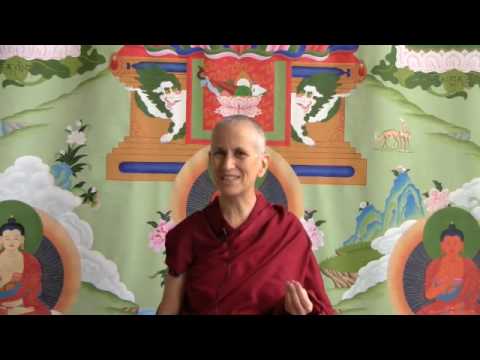Distrust of false appearances
Part of a series of Bodhisattva's Breakfast Corner talks given during the Green Tara Winter Retreat from December 2009 to March 2010.
- The meaning and purpose of the words “distrust” and “disbelief” depend on context
- We develop distrust and disbelief in false appearances
Green Tara Retreat 048: Disbelief and distrust of false appearances (download)
[Responding to written question from audience]
Somebody asked, “I’m trying to understand the following, written by Guy Newland. Guy said, ‘As we deepen our understanding of emptiness we grow increasingly to distrust and disbelieve this false appearance, but the false appearance remains until we are buddhas.'” So the question is, “How can our love and compassion grow while our distrust and disbelief increase?”
We have to understand very clearly, when Guy is talking about distrust and disbelieving, what we’re distrusting and disbelieving. These are the false appearances (the appearance of inherent existence, the appearance of an enemy out there), objective in and of themselves; the appearance of a situation that’s hopeless out there, objective, solid, concrete. Those are the kinds of things that we’re distrusting and disbelieving. All those false appearances and the objects of all our misconceptions, that’s what we’re distrusting.
When we’ve analyzed them, we’ve seen those things don’t exist. They can’t exist in the way they appear to us. They can’t exist as we’re holding them to exist. That’s why we distrust them. But we’re not distrusting sentient beings. We’re not disbelieving in sentient beings. Conventional existence exists, we’re not distrusting that. Dependent arising, that’s a valid, reliable, accurate way of existing. We’ve established it through reasoning. We don’t need to distrust that. There are dependently arising sentient beings. They have dependently arising suffering and happiness. We function in that conventional world. We have to be very clear.
When you’re a bodhisattva you don’t go around distrusting sentient beings. If you do, you’re going to have a very hard time having compassion for them. When our mind is full of distrust, it’s hard to be compassionate. We’re too busy sitting there, “Oh, they’re like this … ” Too much suspicion and distrust, and where does that suspicion and distrust come from? “I want to be safe. I don’t want to suffer.” There’s a lot of self-centeredness and self-grasping in there.
We’re not distrusting sentient beings, we’re distrusting the distrust. The distrust is having the appearance of objective sentient beings that are out there like that. “I can’t trust them, they’re not worthwhile.” That’s a false appearance, isn’t it? When we examine there are areas in which we trust sentient beings. We have to. Our whole existence depends on them and they’ve come through for us.
Venerable Thubten Chodron
Venerable Chodron emphasizes the practical application of Buddha’s teachings in our daily lives and is especially skilled at explaining them in ways easily understood and practiced by Westerners. She is well known for her warm, humorous, and lucid teachings. She was ordained as a Buddhist nun in 1977 by Kyabje Ling Rinpoche in Dharamsala, India, and in 1986 she received bhikshuni (full) ordination in Taiwan. Read her full bio.


